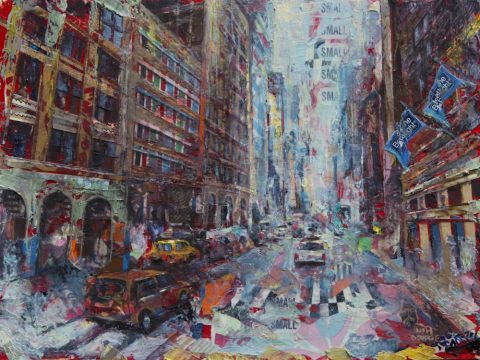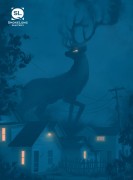My aunt Lydia keeps a leather-bound notebook at the bottom of her purse. She calls it her lotto book. On the bus, passing by a billboard, she might dig it out – not bothering to dust off bits of tissue speckled like dandruff on the cover – and jot down the numbers that really speak to her. Sometimes I offer up suggestions of my own. The number 5 in the 1-800 number printed on the bench at the Millner Avenue stop. The number 14 on a sidewalk sign outside a sushi restaurant. I trace their shapes on the foggy window, but Lydia rarely chooses them.
“Two.” She mutters the word, then pulls down the pen that she keeps behind her ear, licks her thumb, and leafs through the pages of her book. Her arthritic fingers jut out in odd directions. We’re at the Roosevelt stop, two from where we get off.
Two, two, two, two. I let the word roll around my head, feel it glossing over my thoughts like a marble coated in paint. I try to imagine what my aunt might feel, and for just a moment I think I do. But as quickly as this insight comes, it’s gone and I’m aware of the bus doors hissing open.
It’s a van Lydia’s looking at, parked on the opposite side of the street. “Thompson Dry Cleaning,” its side says. “We Deliver 2 You!” The bangles stacked along her wrists jangle as she writes. When she’s done and the lotto book is tucked back inside her purse, she turns to me and grips my arm. “Tonight, Viv. We hit big tonight. I feel it. These numbers really speak to me.”
*
Our stop is at the Circle K on Westmore. Lydia hands me the grocery bags to carry and wiggles her wide frame down the aisle ahead of me. She told me once that her trips to Circle K are sacred. “It’s like church to me,” she’d said. I take this into account each time we visit, keeping quiet as I browse through the bags of chips and candies. For fifteen minutes she stands at the ticket table, tall and statuesque, with her back turned on the rest of the world, her purse slung across her shoulder, her lotto book lying open before her.
At the counter, she slides her filled out cards and four twenty-dollar bills to the cashier in exchange for her printed Big Bux tickets. She turns to me and winks, as if to clue me in to some big secret.
*
Once home, I help Lydia pull the couch back from the living room wall so we can sit closer to the TV. On the night of a Big Bux drawing (every Wednesday and Saturday) we set up tray tables and eat our dinner side by side. Lydia’s parrot, Mickey, watches us from his cage in the corner while we watch the local evening news.
“I went to grade school with her.” My aunt takes a bite of her Swedish meatball frozen dinner and gestures toward the screen. A woman is seated at the defendant’s table of a courtroom, slumped over and sobbing in her chair. The newscaster’s voiceover reports she is guilty of murder in the third degree and has been sentenced to twenty years without parole. I wonder if Lydia might record the number 20 in her lotto book, but she takes another bite instead.
“Her folks were stinking rich,” Lydia says between chews. “She used to come to school and brag about things, like how her family hired out a private masseuse. Sometimes, I’d go home and rub my mother’s body lotion on my legs and let the dogs lick it off. With my eyes closed, it felt just like a massage.”
Rain patters sideways against the window and the TV cuts in and out. Lydia gets up and adjusts the antenna until the picture is stable again.
*
We watch the rest of the evening news, then Jeopardy!, The Wheel, and a few prime-time comedies. Occasionally, a clap of thunder rattles the room. The framed pictures, of places Lydia hopes of one day seeing, chatter like teeth against the walls. There’s one of the Grand Canyon next to Mickey’s cage, a National Geographic poster with creases still visible on its surface.
Lydia sees me eyeing it. “You’re more likely to get murdered during a trip to the Grand Canyon, than win the Big Bux jackpot,” she tells me. “Can’t say it’s the safest place to visit, but it does look pretty beautiful.”
I suggest the idea of a road trip out there with the prize winnings, explaining we could use a little bit of adventure in our lives. Lydia picks at her teeth and considers this for a moment. “Why stop there?” she asks. “We could go anywhere we’ve ever wanted.”
*
I open my eyes. I’m in bed, still wearing my t-shirt and jeans, with no memory of having fallen asleep the night before.
Lydia’s already awake, hunched over the kitchen table with the Sunday paper and her lotto book. I watch her from the doorway of my bedroom as she flips through the obituaries, circling and underlining, dog-earing pages for later. The usual clutter surrounds her: unopened mail, coupons, receipts, empty cups with bright lipstick on their rims. But in the center, something new. An atlas, its pages yellowed with age, turned open like a flower in bloom.
“Supposed to rain again today,” she says without looking up. “But not ‘til this afternoon.”
I take my seat across from her and look towards the window. Flecks of dust dance and shimmer in the light streaming through it and though I’ve never seen it in person, I’m reminded of snow. I wonder what Alaska might be like, if it’s true that the sun comes out at midnight there. I sit here for some time and think about how different that could make things.



 The core workshop of SmokeLong Fitness is all in writing, so you can take part from anywhere at anytime. We are excited about creating a supportive, consistent and structured environment for flash writers to work on their craft in a community. We are thrilled and proud to say that our workshop participants have won, placed, or been listed in every major flash competition. Community works.
The core workshop of SmokeLong Fitness is all in writing, so you can take part from anywhere at anytime. We are excited about creating a supportive, consistent and structured environment for flash writers to work on their craft in a community. We are thrilled and proud to say that our workshop participants have won, placed, or been listed in every major flash competition. Community works.